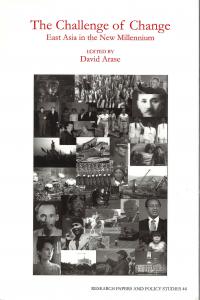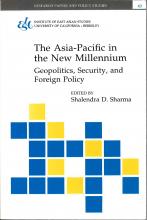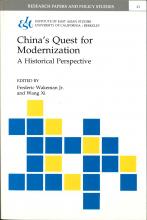The Challenge of Change
The Challenge of Change
David Arase, ed.
This volume is a festschrift for Chalmers Johnson by students and colleagues inspired by his penetrating insight into East Asian affairs, his careful attention to context, and his academic rigor and integrity. It may also be read as a collection of essays organized around a fundamental premise in contemporary East Asian political affairs: the East Asian project of modernity that has yet to be completed. Section 1 is on socialism's failure in China; section 2, the demise of Japan's capitalist model of development; section 3, reconciling the divided nations of China and Korea; section 4, the U.S. role in the region; and section 5, Johnson's scholarship.
As a nonprofit academic press, we need your support to publish our books. Your gift can help us make more of our titles available as e-books. DONATE NOW
Title information
This volume is a festschrift in honor of Chalmers Johnson by former students and colleagues. The essays are organized around the theme of the East Asian project of modernity.
Contributors:
Marie Anchordoguy is associate professor of East Asian studies and chair of the Japan Studies Program at the Henry M. Jackson School of International Studies at the University of Washington.
David Arase is associate professor of politics at Pomona College, Claremont, California.
Richard Baum is professor of political science and director of the Center for Chinese Studies at UCLA.
Herbert P. Bix is a professor of history and sociology at the State University of New York at Binghamton.
Lonny E. Carlile is an associate professor of Asian studies with the Center for Japanese Studies and the Asian Studies Program at the University of Hawaii at Manoa.
Maria Hsia Chang, professor of political science at the University of Nevada, received her Ph.D. in political science from the University of California, Berkeley.
Mikyun Chin is associate professor in the Department of Political Science, Ajou University, Republic of Korea.
Bruce Cumings teaches international history, modern Korean history, and East Asian political economy at the University of Chicago.
Teruo Gotoda is professor at Soai University, Osaka, Japan.
Toshiya Kitayama is professor at the School of Law, Kwansei Gakuin University.
Kongdan (Katy) Oh is a research staff member at the Institute for Defense Analyses and a nonresident senior fellow at the Brookings Institution.
Suzanne Pepper is a Hong Kong–based writer. Her recent publications include Radicalism and Education Reform in Twentieth Century China (Cambridge, 1996, 2000).
Koji Taira, native of Okinawa, is professor emeritus of economics and industrial relations at the University of Illinois at Urbana-Champaign.
Peggy Takahashi is associate professor of management at the University of San Francisco's School of Business and Management.
Danny Unger teaches in the Department of Political Science at Northern Illinois University.
Lynn T. White III teaches in the Politics Department, Woodrow Wilson School, and East Asian Studies Program at Princeton.
David Arase, ed.
David Arase is currently resident professor of international politics at the Johns Hopkins University-Nanjing University Center for Chinese and American Studies, Nanjing University. Before that, he was professor of politics at Pomona College, Claremont, CA. He is the author of Buying Power: The Political Economy of Japan's Foreign Aid (1995), co-editor of The US-Japan Alliance: Balancing Soft and Hard Power in East Asia (2009), and editor of The Challenge of Change: East Asian in the New Millennium (IEAS, 2003).
B.A. in Liberal Arts, Cornell University; M.A. in International Relations, Johns Hopkins School of International Studies; Ph.D. in Political Science, University of California, Berkeley.
The Challenge of Change (RPPS 44)
Preface – vii
Contributors – ix
Introduction – 1
SECTION ONE: Postsocialist China – 15
- 1. Present Nationalism and Communist Power – 19
Richard Baum - 2. The Revival of Chinese Millenarian Movements: The Case of Falun Gong – 38
Maria Hsia Chang - SECTION TWO: The Demise of the East Asian Developmental State – 61
- 3. The Heuristic Value of the Developmental State Model as Applied to Southeast Asia – 67
- Danny Unger
- 4. The "Free Economy" and the Developmental State: The Changing Ideology and Politics of Japanese Organized Business, 1965–1980 – 91
Lonny E. Carlile - 5. Japan's Developmental State in the 1990s and Beyond: Has Industrial Policy Outlived Its Usefulness? – 113
Marie Anchordoguy - 6. Japan: From Miracle to Mediocrity – 134
Teruo Gotoda - 7. How Japan Can Move toward a Third Major Reform – 156
Peggy K. Takahashi and Toshiya Kitayama - SECTION THREE: The Normalization of East Asian Relations? – 173
- 8. Hong Kong and the Challenge of Chinese Reunification for U.S.-China Policy – 178
- Suzanne Pepper
- 9. Civil Society in South Korean Democratization – 201
Mikyung Chin - 10. South Korea's Foreign Policy: A Dolphin among Whales? – 215
Kongdan (Katy) Oh - 11. Sino-Japanese Relations in Transition – 235
David Arase - SECTION FOUR: History Restarted, or Deferred? The U.S. Role in Asia – 253
- 12. The Continuation of the Cold War and the Advent of American Militarism – 259
- Chalmers Johnson
- 13. The Okinawa Factor in U.S.-Japan Relations – 273
Koji Taira - 14. In Search of Emperor Hirohito: Decision Making and Ideology in Imperial Japan – 298
Herbert P. Bix - 15. Occurrence at No Gun Ri Bridge: An Inquiry into the History and Memory of a Civil War – 311
Bruce Cumings - SECTION FIVE: A Final Tribute to Chalmers Johnson – 337
- 16. Functional Stories: Uses for Communist, Developmental, Military, and Individualist Ideologies – 341
- Lynn T. White III
- Chronological Bibliography of Chalmers Johnson's Published Works – 373



